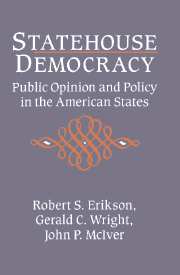Book contents
- Frontmatter
- Contents
- Preface
- 1 Democratic states?
- 2 Measuring state partisanship and ideology
- 3 Accounting for state differences in opinion
- 4 Public opinion and policy in the American states
- 5 State parties and state opinion
- 6 Legislative elections and state policy
- 7 Political culture and policy representation
- 8 Partisanship, ideology, and state elections
- 9 State opinion over time
- 10 Conclusions: Democracy in the American states
- References
- Index
Preface
Published online by Cambridge University Press: 04 August 2010
- Frontmatter
- Contents
- Preface
- 1 Democratic states?
- 2 Measuring state partisanship and ideology
- 3 Accounting for state differences in opinion
- 4 Public opinion and policy in the American states
- 5 State parties and state opinion
- 6 Legislative elections and state policy
- 7 Political culture and policy representation
- 8 Partisanship, ideology, and state elections
- 9 State opinion over time
- 10 Conclusions: Democracy in the American states
- References
- Index
Summary
In recent years, citizens of many nations have struggled to establish democratic institutions where none had existed before. As political scientists, we can ask what justifies this passion for “democracy?” Part of the answer is easy: political freedom. Empirically as well as in theory, where democratic institutions prosper, people are freer to speak and act without fear of arbitrary intrusion from government authority. But freedom from government intrusion is not the sole justification for democratic government. In theory, the democratic ideal of popular sovereignty means that collectively, citizens can actively shape what their governments do. The relevant empirical question becomes whether, in practice, democratic institutions allow public opinion to influence government policies very much. Modern political science is still working on the answer to this important question.
This book addresses the question of democratic representation for one set of democratic governments: those of the 50 separate states of the United States. The Constitution of the United States reserves many government powers to the states. The policies that states enact are often described in terms of their ideological content as relatively liberal or relatively conservative. We use this ideological dimension to assess the correspondence between public opinion and policies across the states.
We began this project several years ago, from a sense that public opinion had been seriously neglected in the political science literature on state policymaking. As we assembled our statistical evidence, we found a pattern that was even stronger than our initial suspicions: State ideological preferences appeared to dominate all other variables as a cause of the ideological tilt of a state's policies.
- Type
- Chapter
- Information
- Statehouse DemocracyPublic Opinion and Policy in the American States, pp. vii - xPublisher: Cambridge University PressPrint publication year: 1994



